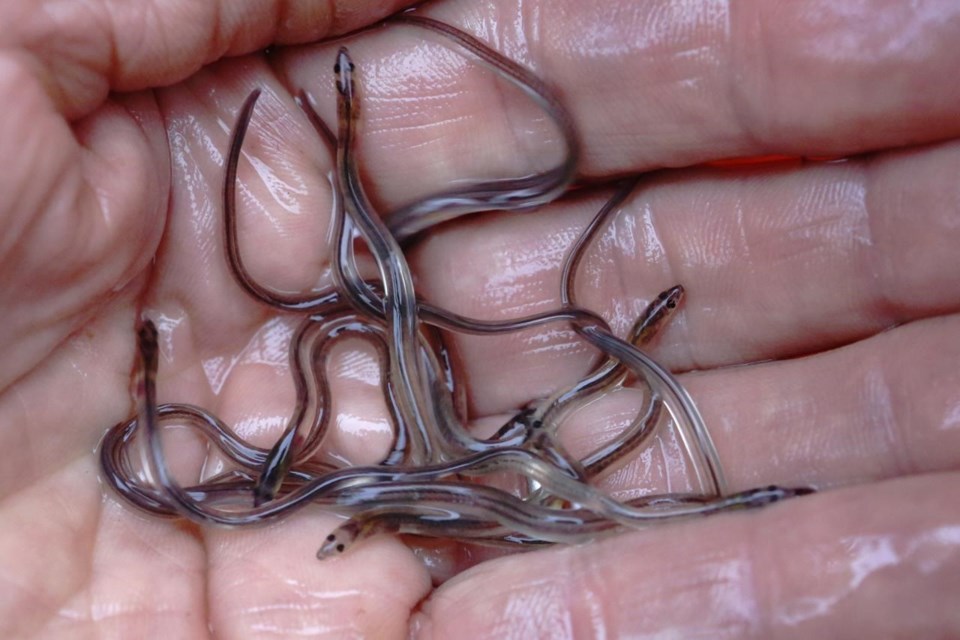HALIFAX — Last week’s seizure of more than 100 kilograms of baby eels at Toronto Pearson International airport is СŔ¶ĘÓƵ welcomed as a significant step by a commercial elver fisher in Nova Scotia.
But Stanley King of Atlantic Elver Fishery said in an interview Tuesday that the seizure by federal officials is long overdue.
“This is the first bust in 2024 at an export point. and we are basically at the end of the season, so I think it will be the lone bust,” said King. “But we do hope that it’s the first of many (future interceptions) and it’s welcome news for now.”
The federal government closed the lucrative commercial baby eel fishery on March 11 after violence and intimidation plagued last year's fishing season in Nova Scotia and New Brunswick.
The seizure of 109 kilograms of the tiny eels known as elvers was carried out last Wednesday by the federal Fisheries Department and the Canada Border Services Agency. Federal officials said the eels were destined for shipment overseas and were worth between $400,000 and $500,000.
King said that while the bust is significant, it needs to be kept in perspective when it comes to the scale of the problem with black market shipments across Canada’s borders.
“A 100-kilogram bust in Toronto may seem like a big bust, and for a one-off it is, but many tonnes have left Canada’s airports this year and tens of tonnes left last year, “ he said. “This is a small percentage of what likely has left the country.”
In an email, a spokeswoman for the federal Fisheries Department in the Maritimes said the seizure is still СŔ¶ĘÓƵ investigated for violations under the federal Fisheries Act. Lauren Sankey said that fishery officers have the authority to dispose of seized fish at their discretion, whether they are destroyed, sold or returned to the water.
Sankey said that in this case, it wasn’t possible to determine the elvers’ river of origin, the sanitation of their container, or whether they contained parasites.
“These conditions must be accurately determined before elvers can be released, otherwise the health of the elver population in rivers could be jeopardized, she said. “As the river of origin could not be determined and an alternate disposal option could not be secured, the elvers were destroyed.”
King is part of a group of commercial fishers who have been calling for more enforcement and stiffer penalties for poaching elvers on coastal rivers in the Maritimes.
Federal Fisheries Department data shows that 149 people have been arrested for elver-related offences and nearly 208 kilograms of elvers have been seized since March 6. Authorities have also seized 23 vehicles as well as 283 dip nets and 152 trap-like fyke nets.
Last month the department arrested five people from Maine for illegal fishing in Meteghan, a community in Nova Scotia's Digby County.
“The industry is pleased with the increased enforcement efforts this year, there’s no doubt about that,” King said.
Still, he said fishers are concerned about the pace of the adoption of new regulations proposed by federal Fisheries Minister Diane Lebouthillier. Among the measures is a new system of possession and export licences to track elvers from the time they are caught until their shipment overseas.
“They are moving incredibly slow and are refusing to give us a timeline,” said King, who added it has left the industry wondering whether there will be a season in 2025.
The federal Fisheries Department was not immediately able to comment on the status of the proposed measures.
Elvers, also called glass eels, are typically flown to Asia where they're raised to maturity and sold for food and used in unagi dishes at sushi restaurants. Prices reached as high as $5,000 per kilogram in 2022.
This report by The Canadian Press was first published May 21, 2024.
Keith Doucette, The Canadian Press




